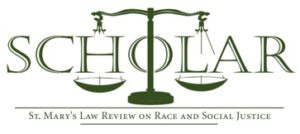The Scholar
Our Mission

The Scholar’s mission to “give a voice to the voiceless” is fulfilled both by shedding light on issues affecting disadvantaged communities and by reaching out to the community at large and informing, educating, sharing, and growing with them.
In today’s climate, in which affirmative action is seen as a necessary evil, and in which racial and gender discrimination are viewed as problems of the past, this scholarly journal aims to extend and further the legal discourse surrounding issues that touch upon race, ethnicity, class, gender, sexual identity, immigration and countless others.
Our primary goal is to educate ourselves and, in the process, offer different perspectives not often allowed or sought after in our society. As such, The Scholar strives to publish articles that offer insight into the struggles minority groups face today and that serve as building blocks for an understanding of contemporary racial and social justice issues. Our hope is that these building blocks will form bridges that unite all members of our society, connect groups within our communities, and promote self-discovery and understanding.
“Never doubt that a small group of thoughtful, committed citizens can change the world; indeed, it’s the only thing that ever has.” – Margaret Mead
History
It started out as a brave vision in the minds of six law students. In the waning years of the 1990s, following the decision in Hopwood v. University of Texas — along with Proposition 187 in California; Amendment 2 in Colorado; the end of federal and state affirmative action programs; and other various aggressive assaults on civil rights laws, immigrant rights and bilingual education — St. Mary’s Law students decided to revive a project to create a legal publication which spoke to minority issues. The group of students sought to create a law review that would give a voice to ethnic minorities, gays and lesbians, immigrants, racial minorities, women and other disenfranchised groups which are often silenced in our legal discourse. To make the bold claim that their work, their communities and their lives are important.
With blind enthusiasm, students dragged leftover furniture from the bowels of the Law Library basement and booted up computers that hadn’t been touched in four years. Twenty courageous students joined The Hispanic Scholar as writers. After only a few months, they changed the name to The Scholar: St. Mary’s Law Review on Minority Issues. The Scholar was given a minimal budget, just enough to publish its first volume. To build our community, we paid for office supplies, an office refrigerator and a coffee maker out of our own pockets.
Though always worried about administrative details — slow computers, no postage for solicitation, a leaky roof — the students set out, as a team, to learn how to write and edit. Using Donald M. Murray’s The Craft of Revision and inviting the instruction of professors, the students scoured for “gems” in our writers’ discovery drafts. The most exciting part of this challenging process was watching writers discover and develop their provocative, profound topics. These topics were the essence of diversity; founded fundamentally on the experience, history and culture of disenfranchised peoples. They were legal examinations into our experiences, histories and cultures, most of which had never been the subject of scholarly legal discourse.
The student’s sense of the importance of this work and the depth of their commitments complicated the inevitable emotional and political struggles of inventing a new organization. “A word is not a crystal, transparent and unchanged; it is the skin of a living thought, and may vary greatly in color and content according to the circumstances and the time in which it is used.” — Oliver Wendell Holmes, Jr. Our words, the words of our families and our communities are an explosion of color. With anger, pain, struggle and joy, The Scholar writers and editors add their words to the on-going conversation of the law. With gratitude and hope, these writers and editors present The Scholar: St. Mary’s Law Review on Race & Social Justice: our words.
Volume 24 Board and Staff (2021-2022)
Editorial Board
- Editor in Chief: Lydia R. Harris
- Managing Executive Editor: Natalie N. Garcia
- Executive Editor: San Juanita Gonzalez
- Associate Editor: Zachary K. Gilbert
- Associate Editor: Sophia R. Sanchez
- Solicitations Editor: Carin D. Wieters
- Executive Editor: Muniza Samiullah
- Associate Editor: Rosa M. Peterson
- Comments Editor: Alexandria R. Booterbaugh
- Comments Editor: Avery Tucker
- Symposium Editor: Elizabeth Pliego
Faculty Advisory Committee
- Mike Martinez, Jr., Chair
Staff Writers
- Amanda Aguilar
- Isabella Arciba
- Kathryn Cantu
- Brianna Chapa
- Kyra Falcone
- Charles Garcia
- Sarah Garcia
- Emily Grannell
- Elsa Guerra
- Maya Henry
- Jacob Hernandez
- Vanessa Herrera
- Kayla Menchaca
- Juan Muñoz Zarate
- Raven Peña
- Michael Perez
- Daisy Ramirez
- Julia Rausch
- Maria “Elisa” Reyes-Hinojosa
- Kaylynn Rojas
- Ashley Salinas
- Ashlyn Scott
- Jacqueline Skaggs
- Jade Smith
- Dianisa Sosa
- Savina Tapia
- Elizabeth Vela
- Grethel Villarreal Cantu
- Gerardo Villegas Juarez